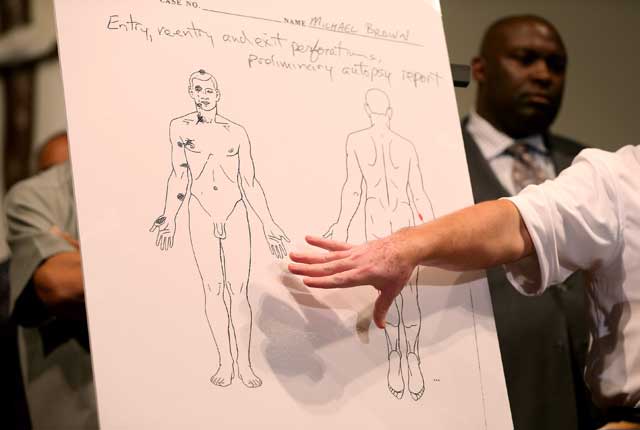At least six bullets from officer Darren Wilson’s gun hit 18-year-old Michael Brown, according to preliminary results released today from a private autopsy ordered by Brown’s family. This would be the second autopsy performed on Brown’s body with a third by federal authorities expected in the next couple of days. There’s no statement yet on how many bullets were fired. Below, a round-up of great reporting and fact-based commentary to help you sift through the swirl of opinion surrounding the Brown shooting. Let’s go:
No surprise here. A new national poll shows "stark racial divisions in reactions to Ferguson police shooting." But the Pew survey also found that among whites, 37 percent said the Michael Brown shooting "raises important issues about race." That’s up from 28 percent responding to the same question last July around the time of George Zimmerman’s trial and acquittal.
In St. Louis, zip codes trump genetic codes. That’s according to a timely new study of regional disparities out this June, comparing the health and wellbeing of residents of largely African-American zip codes with those in predominantly white and wealthier areas. Speaking to NPR, lead author and Wash-U professor Jason Purnell says: "The thing that troubles me is that so many children are growing up without opportunities [and] resources….I really want to change the paradigm in this region from viewing children in disinvested under-resourced areas as problems to viewing them as resources to be invested in."
In two pieces published a day apart, The New Yorker’s Jelani Cobb sees evidence of organizing in Ferguson while The New York Times’ Julie Bosman finds a lack of leadership and clergy complaints about an inability to control protesters.
It’s the boring things that count. Military gear gets headlines because of the optics but out-of-sight paper trails of criminal debt are no less important. St. Louis County’s 90 municipalities rely on revenue generated from traffic tickets and related fines. Those policies, former Missouri state senator Jeff Wilson says, increase pressure on cops to make more stops*. The New Yorker’s Sarah Stillman drives the point home: "The crisis of criminal-justice debt is just one of the many tributaries feeding the river of deep rage in Ferguson"–and it’s a national phenomenon.
Finally, Ferguson’s majority white city council makes it an outlier among cities with an African-American majority or plurality, according to Pacific Standard. Writer Seth Masket says there are national problems at play, "but even given that, Ferguson’s illnesses appear to be unusually acute."
As always, feel free to add your own links. See you back here tomorrow.
*Post has been updated.
